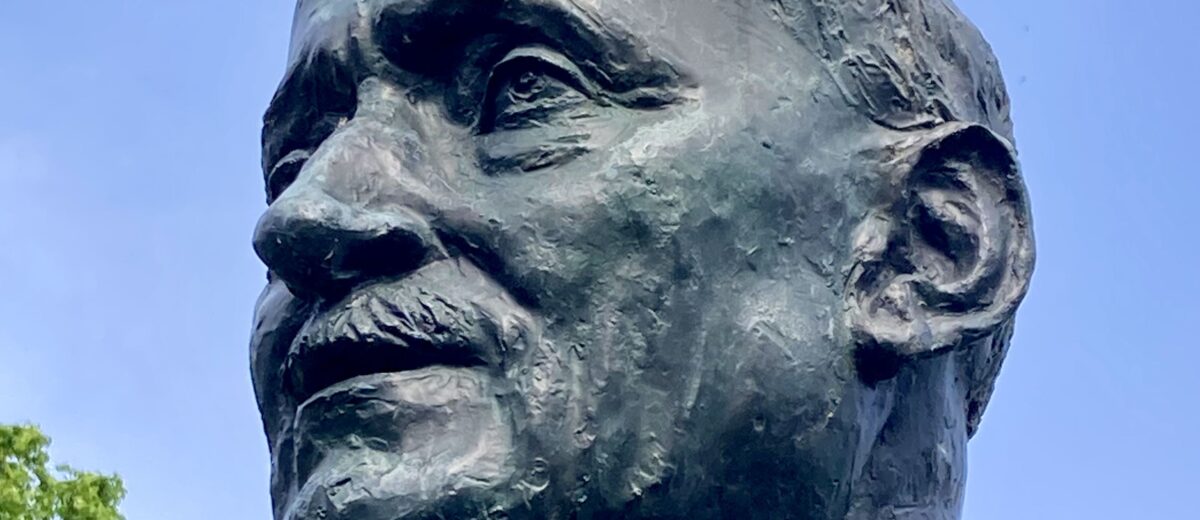Few Europeans today could tell you what these days stand for. Fewer still would have ever thought about the link between the two.
![Photo: [link]Joshua Fuller[/link], Unsplash, CC0.](https://cms.evangelicalfocus.com/upload/imagenes/6638984262b1d_joshua-fuller-TiDa-gEog-s-unsplashCropped.jpg) Photo: [link]Joshua Fuller[/link], Unsplash, CC0.
Photo: [link]Joshua Fuller[/link], Unsplash, CC0.
This coming Thursday, May 9, happens this year to be both Ascension Day and Europe Day – the celebration of two decisive events separated by over 1900 years.
While Ascension Day moves about on the calendar, being 40 days after Easter, Europe Day is fixed on May 9 each year. Few Europeans today could tell you what these days stand for. Fewer still would have ever thought about the link between the two.
For without Ascension Day there would never have been Europe Day.
Ascension Day is the day Christians commemorate the Risen Jesus ascending to the Father in heaven, the end of his physical mission on planet earth. It’s the day he gave his disciples their marching orders, the Great Commission to go everywhere and disciple all peoples.
[destacate] The new understanding of what it meant to be human began to change the way people lived together[/destacate]In obedience to those orders, Paul went to the Greeks and the Romans; Patrick to the Irish Celts; Boniface to the Germanic tribes; Ulfilas to the Goths; Cyril and Methodius to the Slavs. Thousands of other nameless messengers went to countless other tribes and peoples across this peninsula we now call Europe. Everywhere they went, these messengers introduced a world view based on one good, loving, forgiving, creator Father God, who had created humankind in his own image, and revealed himself further through Jesus. This new understanding of what it meant to be human began to change the way people lived together. After the collapse of the Roman order, missionaries established new communities called monasteries, based on covenant, on agape love for God and neighbour. These became the building blocks of a new European order, centres of worship and devotion, art and music, agriculture and gardening, publishing and commerce, education and law.
Sadly, the story of Europe has its many dark chapters. The Church often did not live up to the teachings of her founder. Rulers then, as now, abused the Christian faith as a tool of oppression and control. Despite this, Europe’s culture, identity and values were fundamentally shaped by the story of Jesus as told in the Bible. Even the arch-atheist Richard Dawkins has repeatedly stated: you cannot understand Europe without understanding Christianity and the Bible. That’s one thing we agree on together.
So Ascension Day marks the beginning of the missionary movement which shaped Europe’s identity, culture and values.

[photo_footer]Robert Schuman. / Jeff Fountain, Weekly Word [/photo_footer] Europe Day, and what it stands for, is a long-term fruit of this movement. If you are familiar with this column, you probably will know that on May 9, 1950, the French Foreign Minister, Robert Schuman (see photo above) called a press conference in Paris to make an important announcement. In a speech lasting a mere three minutes, Schuman presented a radical plan which laid the foundations for the European house in which today 450 million Europeans live together in peace. And millions more today – Ukrainians, Georgians, Moldovans, Albanians, Belarusians – would like to join them.
Three minutes! Less time than it takes to boil an egg! Three minutes that changed Europe. It’s a story few know or remember. We need to remind ourselves of that story. That is what Europe Day is for!
Schuman’s plan was to unite the coal and steel industries of France and Germany, and of any other nation wanting to join, under a common authority. In his speech Schuman said:
The solidarity in production thus established will make …war between France and Germany … not merely unthinkable, but materially impossible. […] It may be the leaven from which may grow a wider and deeper community between countries long opposed to one another.
Yet this project was not just economic and technological, he warned. It needed a soul. It was the first step towards creating a community of peoples deeply rooted in Christian values of peace, equality, justice and solidarity.
[destacate]Robert Schumann saw the European story as rooted in the Christian story[/destacate]What inspired Schuman’s thinking was his own deep personal faith in Jesus Christ. He saw the European story as rooted in the Christian story. The new Europe had to be re-rooted into that same story. Cut off from those roots, Schuman believed, Europe would lose the foundations for equality, human dignity, tolerance and compassion.
This is the story we need to keep telling each other, and our (grand)children, on Europe Day.
That is why on Ascension Day and Europe Day this Thursday, we will explore this story in greater depth in the Chapel for Europe in Brussels, in a European Studies Day, tracing how the Gospel shaped Europe and European integration, and can still shape EU politics.
Friday evening we open the State of Europe Forum with a public celebration open to all, in the Carmelite Church in Brussels. On Saturday, the forum continues with seminars and plenaries on the theme ‘Wake up Europe!’
Jeff Fountain, Director of the Schuman Centre for European Studies. This article was first published on the author's blog, Weekly Word.
[analysis]
[title]One more year[/title]
[photo][/photo]
[text]At Evangelical Focus, we have a sustainability challenge ahead. We invite you to join those across Europe and beyond who are committed with our mission. Together, we will ensure the continuity of Evangelical Focus and Protestante Digital (Spanish) in 2024.
Learn all about our #OneMoreYearEF campaign here (English).
[/text][/analysis]

Las opiniones vertidas por nuestros colaboradores se realizan a nivel personal, pudiendo coincidir o no con la postura de la dirección de Protestante Digital.
Si quieres comentar o